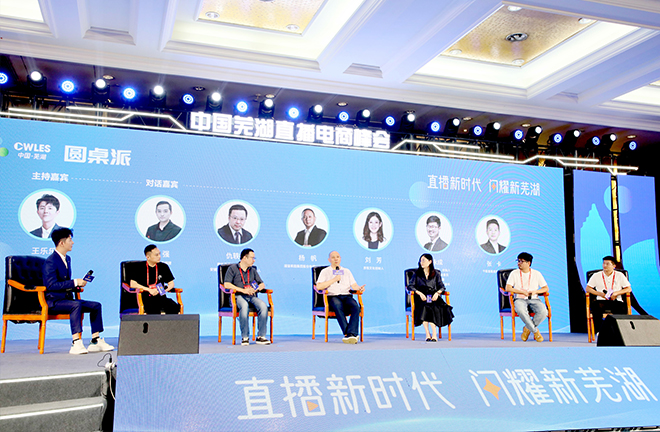Roles and mechanisms of platform ‘interest leaders’

China Wuhu Livestream E-Commerce Summit held in Wuhu, Anhui province on July 8th Photo: Li Qingsong/CNSphoto
Many online platforms today use recommendation algorithms to distribute and deliver content based on users’ interest, as if offering them a certain level of preference autonomy. The question is, though, whether and how individual interest is influenced by other users in the algorithmic recommendation system, thereby affecting the evolution of platform user interest.
To answer that question, it is necessary to clarify the theoretical dimensions, roles and functions of “interest leaders” on platforms driven by recommendation algorithms. Certain intermediate users on algorithm-driven platforms play the role of interest “influencers” and “agents,” as their interest influences the algorithmic recommendations made to others, gradually changing the interest of the “recipients.”
Roles and functions
There are three noteworthy aspects of the roles and functions of platform “interest leaders.”
First, “interest leaders” are intermediate rather than direct influencers. Through their interactive relationship with algorithms, they affect the way algorithms exert influence on individual interest and the direction of this influence. As a result, what seems to cater to users’ own interest is actually “interest,” with specific leanings and orientations. This process allows for the transmission of key users’ interests and the shaping of platform interests.
Second, “interest leaders” are not followers or recipients centered around interest. Instead, they focus on leadership and agency.
Third, “interest leaders” underline the influence of the overall “interest state” of people’s likes and dislikes, rather than the influence of a particular opinion or a particular attitude towards a public event.
Fundamentally, algorithmic recommendation is not only a computational technique for inferring people’s preferences. It also constitutes the social relations where interest is spread between users with algorithms as intermediaries.
Operating mechanisms
“Interest leaders” on algorithmic-driven platforms primarily function through four mechanisms.
The first is the “algorithmic expert.” Certain users, referred to as “algorithmic experts,” guide other content producers to learn the rules of algorithmic recommendation set by the platform and monetize their content. This leads platform users to produce content in line with specific interest and leanings, while also shaping the characteristics of platform interest.
“Algorithmic experts” claim to know how algorithms “actually work.” They teach content producers to estimate the value of their content and format it according to platform metrics. They also encourage content producers to build and manage their audience.
The second mechanism is the “visible user.” User visibility in the algorithm affects the extent to which user interest is communicated to the algorithm, which in turns affects the effectiveness of interest diffusion from an individual user or a user group to other users through intermediary algorithms. A handful of highly visible users may even influence what and how interest is recommended by the algorithm across the entire platform.
Users who have high visibility within the algorithmic system often become popular figures and are followed by other users in content production. The followers thus gradually understand the culture and participation rules of the online platform and begin predicting popular types to modify their own content accordingly.
The third mechanism is high connectivity. As users and their friends tend to have similar interests, recommendation systems make use of these social relations for filtering and making recommendations. This mechanism, in turn, affects the evolution of user interest. Individuals with stronger social connections and higher social homogeneity are more likely to be recommended to other users through algorithms and generate more connections on algorithm-driven platforms, making it easier for their interests and preferences to radiate out to other users.
The fourth mechanism is active feedback. Platform recommendations can amplify the interest of active users through algorithmic feedback. Social media studies find that algorithm performance relies heavily on active users, and recommendation hit rates vary dramatically when active users change. As overactive users strongly influence recommendation systems, their asymmetric impact on the popularity of content can be replicated by recommendation algorithms. By contrast, individuals who give less feedback to the algorithmic system are more likely to involuntarily become similar to active users.
The roles and underlying mechanisms of platform “interest leaders” largely stem from the pleasing feature and visibility of algorithms, social filtering, user similarities, and feedback activity. They can give rise to data alienation and paradoxical logic, leading to consequences such as interest distortion, interest discount, and false interest. Users may enjoy the perceived “freedom of interest,” but in reality, it is actually a “pseudo freedom” formed in the multi-layered, two-way cycle of “algorithms←→intermediate users←→users.”
It is inappropriate to examine future influence models of platform users through the lens of the pre-algorithmic age. Integrating the identification and regulation of “interest leaders” with the guidance, management, and development of internet culture is an issue of theoretical and practical importance in the algorithmic age.
Xu Xiang is a professor in the College of Arts and Media of Tongji University.
Edited by WANG YOURAN
